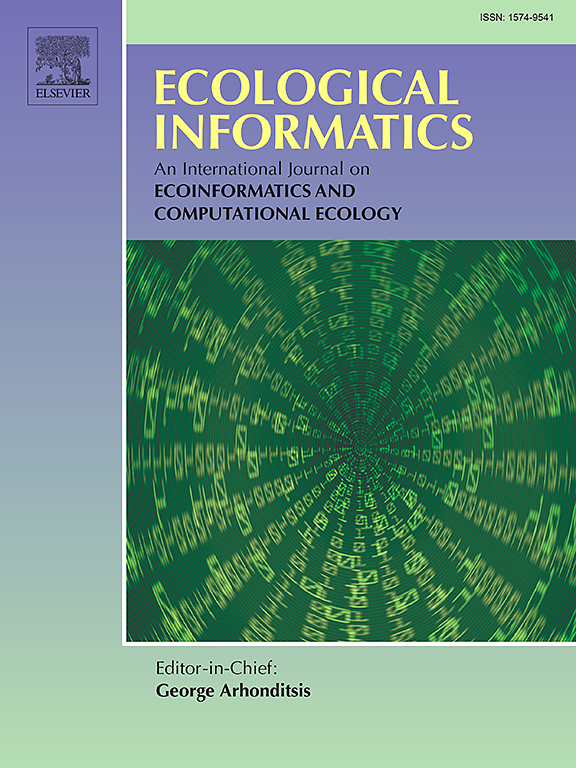Data quality issues in data used in species distribution models: A systematic literature review
IF 7.3
2区 环境科学与生态学
Q1 ECOLOGY
引用次数: 0
Abstract
Species distribution models (SDM) are important tools for decision-making in several application areas, being essential for managing biodiversity resources in the world. The ability of these models to represent the reality is strongly dependent on the fitness of the data from which they are generated. Although scientific literature recognizes the occurrence of several data quality (DQ) problems, little work has focused on conducting a comprehensive survey to identify and quantify these challenges. Thus, this paper conducts a systematic review of the literature to examine the DQ problems observed in species occurrence and environmental data applied to the SDM context. It also identifies and discusses solutions that have been proposed to address these problems. A total of 212 articles were selected and analyzed to identify 14 recurring DQ problems. Misidentification errors and spatial or geographical bias were the most prevalent. Data gathered through Citizen Science initiatives continue to be a subject of scrutiny, with observer skill identified as the third most frequent challenge. Resolving data quality issues remains a significant research challenge due to the specific characteristics of the data types involved. Our findings highlight the need for a more detailed examination of the impact of data quality on SDMs and call for the development of robust methodologies for data quality assessment and improvement. The paper emphasizes the importance of context-specific knowledge for the effective management of data quality, which is essential for enhancing the reliability of SDMs and supporting more accurate ecological forecasting and conservation planning. Consequently, a substantial body of research remains to be conducted, particularly at the intersection of computational methodologies and the specialized domain of biogeography.
物种分布模型中数据的质量问题:系统文献综述
物种分布模型(SDM)是许多应用领域的重要决策工具,是管理世界生物多样性资源的重要工具。这些模型表示现实的能力很大程度上依赖于生成它们的数据的适合度。尽管科学文献承认存在一些数据质量(DQ)问题,但很少有工作集中在进行全面调查以识别和量化这些挑战。因此,本文对文献进行了系统的回顾,以研究在物种发生和环境数据中观察到的DQ问题,并将其应用于SDM背景。它还确定并讨论了为解决这些问题而提出的解决方案。共选取212篇文章进行分析,找出14个重复出现的DQ问题。识别错误和空间或地理偏差是最普遍的。通过公民科学计划收集的数据仍然是一个审查的主题,观察者的技能被认为是第三个最常见的挑战。由于所涉及的数据类型的特定特征,解决数据质量问题仍然是一个重大的研究挑战。我们的研究结果强调需要对数据质量对sdm的影响进行更详细的检查,并呼吁开发可靠的数据质量评估和改进方法。本文强调了情境知识对于有效管理数据质量的重要性,这对于提高SDMs的可靠性和支持更准确的生态预测和保护规划至关重要。因此,仍有大量的研究有待进行,特别是在计算方法和生物地理学专门领域的交叉领域。
本文章由计算机程序翻译,如有差异,请以英文原文为准。
求助全文
约1分钟内获得全文
求助全文
来源期刊

Ecological Informatics
环境科学-生态学
CiteScore
8.30
自引率
11.80%
发文量
346
审稿时长
46 days
期刊介绍:
The journal Ecological Informatics is devoted to the publication of high quality, peer-reviewed articles on all aspects of computational ecology, data science and biogeography. The scope of the journal takes into account the data-intensive nature of ecology, the growing capacity of information technology to access, harness and leverage complex data as well as the critical need for informing sustainable management in view of global environmental and climate change.
The nature of the journal is interdisciplinary at the crossover between ecology and informatics. It focuses on novel concepts and techniques for image- and genome-based monitoring and interpretation, sensor- and multimedia-based data acquisition, internet-based data archiving and sharing, data assimilation, modelling and prediction of ecological data.
 求助内容:
求助内容: 应助结果提醒方式:
应助结果提醒方式:


